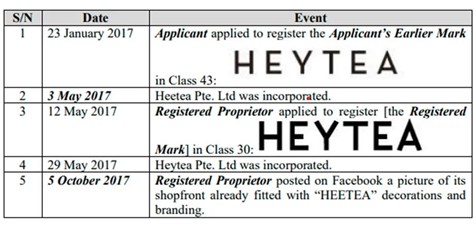HEYTEA is a beverage brand that is taking the world by storm. Proudly made in China, HEYTEA is already part of China's pop culture. HEYTEA, also known as 喜茶XiCha "happytea", is a trademark owned Shenzhen Meixixi Catering Management Co., Ltd. (hereinafter as Meixixi) and was founded by Neo Nie Yunchen in 2012. The product? Bubble tea with cheese and fruit topping.
Started off as a small tea store called "royal tea" (皇茶) in Jiangmen city, Guangdong Province, the brand quickly expanded into other cities in Guangdong and China. Due to a trademark issue, the original name "Royal Tea" was dropped and "HEYTEA" (喜茶) was adopted. By the end of March 2020, HEYTEA operated 450 stores in 37 Chinese cities and 4 stores in Singapore.
Popular for its cheese topped tea and fruit tea, the brand gained such a powerful popularity through Chinese social media to the point to create business collaboration such as Adidas and Fenty Beauty.

HeyTea for Adidas

Hey Tea for Fenty Beauty
After the first dispute for the original name (Royal Tea), in 2019, Meixixi had to face a new challenge in Singapore. A company called Heetea Pte Ltd. - in 2017 - had filed and registered the trademark HEYTEA in class 30 (tea product), while Meixixi had only secured the registration for HEYTEA in class 43 (tea stores).
In 2019 Meixixi filed an invalidation action against the Singapore-based Heetea Pte Ltd. (hereinafter as Heetea) against the trademark application HEYTEA in class 43 in front of Singapore Trademark Office.Four main grounds can be identified during the invalidation procedure.
Firstly, Meixixi argued that the trademark HEYTEA in class 43 is identical or similar to their earlier mark registered on January 23rd 2017 for similar services (tea store), resulting in a likelihood of confusion.
|
|
Shenzhen Meixixi Catering Management Co., Ltd |
Heetea Pte Ltd. |
|
Specimen |
|
|
|
Class |
43 (tea shops etc.) |
30 (tea beverages) |
The hearing officer of the Intellectual Property Office of Singapore held that the marks were identical or at the very least highly similar, and that the goods and services, i.e. tea shops and tea drinks, were similar despite being in different classes. Consumers would be highly misleading in purchasing those drinks.
Therefore, the likelihood of confusion was successfully established.
Secondly, Meixixi claimed that their mark is well known in Singapore and that use of the counterpart trademark in relation to the claimed goods would indicate a connection and be likely to damage their business and asked the examiner to consider their trademarks as wellknown in Singapore.
However, the examiner held that evidence post-dating the registration date could not be taken into consideration.Based on the evidence lodged, the Hearing Officer held that the Applicant's claim was "simply a bare assertion which is not substantiated".
Thirdly, Meixixi argued that the counterpart trademark had been applied for in bad faith. The Hearing Officer held that the chronology of events, including HEETEA setting up a new business entity called HEYTEA Pte Ltd., suggested that the counterpart had registered their mark in bad faith, simply to hold the Applicant ransom or to disrupt their business.

The Hearing Officer also noted how the HEETEA had requested that the hearing proceed without their attendance or filing written submissions or bundle of authorities, for which the officer considered difficult to understand given the serious allegation of bad faith.
Finally, the Applicant argued that the opposed trademark would be in conflict with the laws of passing off and copyright. However, there may have been some lack of clarity in the submissions and evidence. The Hearing Officer simply said that the issues were not fully dealt with, and the Applicant was not successful on Ground 4.

The Singaporean Trademark Office decided to invalidate the trademark HEYTEA in class 30 owned by Heetea Pte Lt. This subject decision provides a useful reminder that enforcement can be taken based on both registered and unregistered rights.
In this case, Shenzhen Meixixi had registered its mark three months before HEETEA, guaranteeing itself to rely on earlier registration rights.
Eventually, a company as well as an individual can protect their marks based on unregistered rights, claim bad faith, passing off, or breach of copyright. However, such actions will depend largely on the facts and evidence in each case.
Therefore, being the first to register a mark, is always the best solution. Not only in China, also in Singapore.
The content of this article is intended to provide a general guide to the subject matter. Specialist advice should be sought about your specific circumstances.


